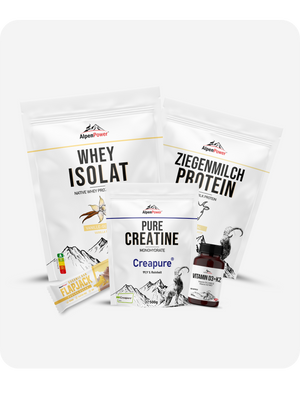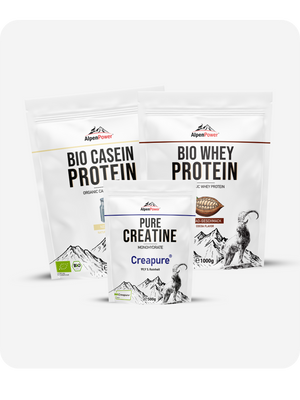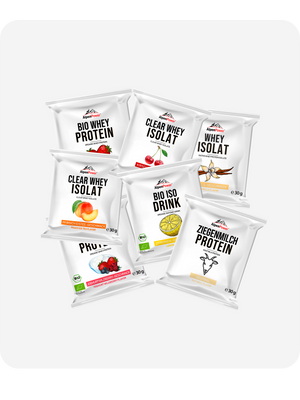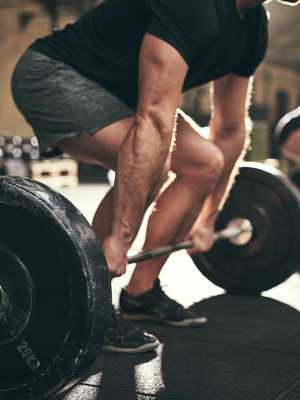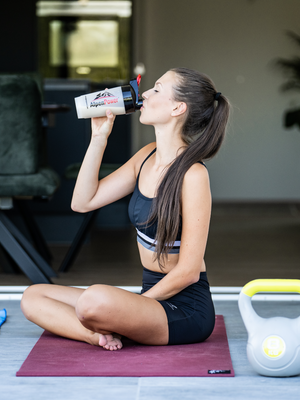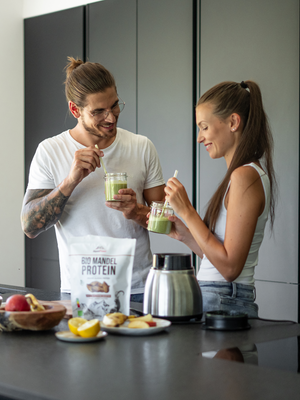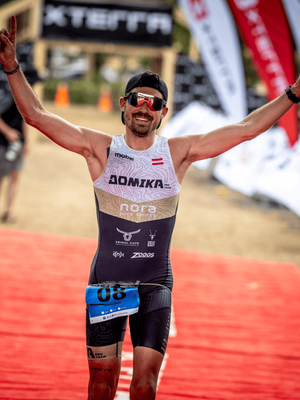The body's adaptation to regular physical exertion is a complex and multi-layered process. Nutrition plays a decisive role, particularly in the area of muscle regeneration after intensive training sessions. One of the most important mechanisms by which the body responds to training is the reduction of oxidative stress. An appropriate diet rich in antioxidants can help minimize oxidative stress and promote muscle recovery. Polyphenols, especially those found in certain plant foods, have been shown to be particularly effective in this regard.
Oxidative stress and the muscles
Oxidative stress is caused by the excessive formation of free radicals and reactive oxygen species (ROS), which are produced in the muscles during intense physical exertion. These molecules can damage cells by attacking membranes and oxidizing cellular material. The muscles, which are particularly stressed during training, are therefore especially vulnerable. The consequences are muscle fatigue, inflammatory processes and delayed recovery.

After intensive training sessions, the muscles are subjected to a regenerative process that is characterized by the repair of micro-injuries as well as a reduction in inflammation and oxidative stress. This is where the role of antioxidants comes into play, as they neutralize free radicals and thus reduce oxidative stress.
Polyphenols and their role in protecting the muscles
Polyphenols, a group of secondary plant substances, have proven to be particularly effective in protecting the muscles. They are characterized by their antioxidant effect and help to reduce the oxidative stress that occurs after intensive training. Various studies have shown that polyphenols from plants such as berries, green tea or grape seeds can reduce the production of free radicals in the muscles and thus accelerate the regenerative process.

A comprehensive study by Lobo et al. (2010) on the effect of polyphenols on oxidative stress and muscle recovery showed that the antioxidant properties of polyphenols can reduce muscle breakdown during exercise and at the same time accelerate muscle repair processes. Particularly noteworthy is the ability of polyphenols to inhibit the production of pro-inflammatory molecules and activate the body's antioxidant defense mechanisms.
The research by Gomez-Cabrera et al. (2008) also confirmed that the intake of polyphenols promotes muscle regeneration after intensive exercise and reduces inflammatory processes. In particular, an improvement in maximum muscle strength was observed after intensive training loads, which indicates the importance of polyphenols for the recovery of muscular performance.
Antioxidant support from Alpenpower products
Alpenpower offers a variety of high-quality products that specifically support muscle recovery and help to minimize oxidative stress after intensive training sessions. A particularly valuable product in this context is Alpenpower Vitamin Cwhich acts as a powerful antioxidant and, together with other vitamins, protects the muscles from oxidative damage. Vitamin C is known to promote the body's natural ability to regenerate and reduce inflammation - an important aspect for rapid recovery after intensive exercise.
Another recommended product from the Alpenpower range is Alpenpower Magnesiumwhich is not only important for normal muscle function, but also has antioxidant properties that help to reduce oxidative stress after training. Magnesium also contributes to the reduction of muscle cramps and the maintenance of good muscle function, which is particularly important after long and intensive training sessions.
Important foods for antioxidant support of the muscles
A balanced diet rich in antioxidants can optimally support the body in combating oxidative stress after training. In particular, foods rich in polyphenols and other antioxidant compounds play a crucial role in muscle regeneration.

-
Berries (e.g. blueberries, strawberries, raspberries, currants)
Berries are one of the best sources of polyphenols, especially anthocyanins, which are known for their strong antioxidant effects. They help to reduce oxidative stress and protect muscles from inflammation. Berries are great as a snack or as an ingredient in smoothies and yogurts.
-
Green tea
Green tea contains a high concentration of catechins, especially EGCG (epigallocatechin gallate), which have strong antioxidant properties. Drinking green tea can help reduce inflammation and speed up recovery after exercise.
-
Dark chocolate (at least 70% cocoa)
Dark chocolate is an excellent source of flavonoids, especially epicatechin, which has an antioxidant effect and can improve blood flow. A small piece of dark chocolate after a workout can not only reduce oxidative stress, but also regulate blood sugar and promote muscle recovery.
-
Grape seed extract and red grapes
Grape seed extract contains resveratrol, a powerful antioxidant that has an anti-inflammatory effect and protects the muscles after intensive exertion. Fresh red grapes are also an excellent source of resveratrol. These foods can help support recovery due to their high polyphenol content.
-
Spinach and other green leafy vegetables
Spinach, kale and other leafy green vegetables are rich in vitamin C, beta-carotene and other antioxidants that help the body fight free radicals. These foods promote overall cellular health and help to protect the muscles.
-
Nuts and seeds (e.g. walnuts, almonds, chia seeds)
Nuts and seeds are not only rich in healthy fats, but also in vitamin E, which has a strong antioxidant effect. These healthy fats support cell health and help fight inflammation and oxidative stress.
-
Tomatoes and other red vegetables
Tomatoes are particularly rich in lycopene, an antioxidant that protects muscles from damage caused by oxidative processes. Lycopene has been shown in studies to reduce inflammation and muscle breakdown. Peppers, carrots and other red vegetables also offer similar benefits.
-
Turmeric and ginger
Turmeric contains curcumin, an active ingredient with anti-inflammatory and antioxidant properties. Ginger also has an antioxidant effect and can help to relieve muscle pain and inflammation after intensive training sessions. These spices can be used in soups, smoothies or teas.
Conclusion: An antioxidant diet for better recovery
The right diet plays a crucial role in supporting muscle regeneration. Foods rich in polyphenols and other antioxidants, such as berries, green tea, grape seed extract or spinach, not only help to reduce oxidative stress after intense training sessions, but also promote overall muscle health and the reduction of inflammation.
In combination with the high-quality nutritional supplements from Alpenpowersuch as Alpenpower Vitamin C, Alpenpower Magnesium, athletes can take their regeneration to the next level and increase their performance in the long term.
With a balanced diet rich in antioxidants and targeted support from nutritional supplements, it is possible to optimize muscle regeneration and maximize training adaptations. This allows the body to start the next training session stronger and refreshed.
Author: Laura Bahmann
Sources:
- Lobo, V., Patil, A., Phatak, A., & Chandra, N. (2010). Free radicals, antioxidants and functional foods: Impact on human health. Pharmacognosy Reviews, 4(8), 118-126.
- Gomez-Cabrera, M. C., et al. (2008). Antioxidant supplementation and physical performance: the effect of polyphenols on muscle recovery after exercise. European Journal of Applied Physiology, 104(5), 889-898.
